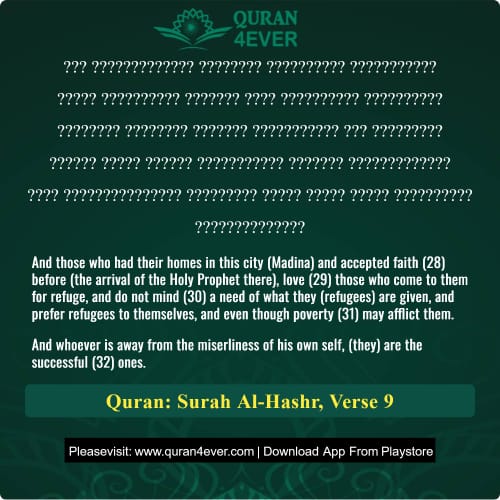
Transliteration:( Wallazeena tabawwa'ud daara wal eemaana min qablihim yuhibboona man haajara ilaihim wa laa yajidoona fee sudoorihim haajatam mimmaa ootoo wa yu'siroona 'alaa anfusihim wa law kaana bihim khasaasah; wa many yooqa shuhha nafsihee fa ulaaa'ika humul muflihoon )
“And those who had their homes in this city (Madina) and accepted faith (28) before (the arrival of the Holy Prophet there), love (29) those who come to them for refuge, and do not mind (30) a need of what they (refugees) are given, and prefer refugees to themselves, and even though poverty (31) may afflict them. And whoever is away from the miserliness of his own self, (they) are the successful (32) ones.” (Kanzul Imaan Translation)
They were made up of two tribes: Aus and Khazraj. Aus and Khazraj were sons of Haritha ibn Tha'albah, and the Ansaar are from their lineage. The word "Dar" (city) refers to Madina Munawwarah. It means these blessed people were already living in Madina and had embraced Islam before the arrival of the Holy Prophet ﷺ.
Instead, they received them with joy, and treated them as brothers, giving them half of their wealth, homes, and gardens. They even made them co-owners of their property. From this, we learn that loving the Muhajireen is part of the perfection of faith, as Allah Almighty praises this quality of the Ansaar.
The Ansaar did not object or feel any resentment. Due to the company of the Holy Prophet ﷺ, their hearts had become pure and angelic, free from jealousy, greed, or ill feelings.
This verse was revealed in praise of Hazrat Abu Talha (RA). Once, a poor and hungry person came to the Holy Prophet ﷺ, who asked, “Who will host this man so that Allah may shower His mercy upon him?”
Hazrat Abu Talha (RA) took him home, but there was only a small amount of food for the children. He instructed his wife to make excuses to the children and put them to sleep hungry. Then at dinnertime, he told her to turn off the lamp, and pretended to eat with the guest while letting the guest eat fully. The family remained hungry.
The next morning, when Abu Talha met the Prophet ﷺ, the Messenger recited this verse and said, “Allah is pleased with what you did.”
Is indeed among the truly successful—like all the Companions, especially the Ansaar. From this we also learn that the conflicts among the Companions were not due to worldly greed, but due to differences of opinion (ijtihad). For deeper understanding, refer to “A Glance on Ameer Muawiyah.”
The tafsir of Surah Hashr verse 9 by Ibn Kathir is unavailable here.
Please refer to Surah Hashr ayat 8 which provides the complete commentary from verse 8 through 10.
[1656]- Before the settlement of the emigrants (Muhājireen) among the Anṣār, for whom a share is delegated as well.

For a faster and smoother experience,
install our mobile app now.
Related Ayat(Verses)/Topics